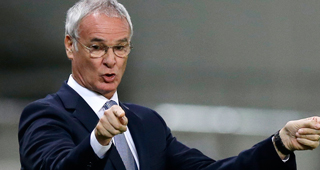In using a small, core group of players in last season’s title run, there was a question of how Leicester City would cope with the added Champions League schedule. Last season, they were knocked out of the both the FA Cup and Capital One Cup by late January, which enabled Claudio Ranieri’s side to focus their attention and energy solely on the league for the remaining months. With Leicester City currently sitting in 13th place in the league, there is credibility to the theory they’ve stretched themselves too thin. Yet they also made history this week as one of five teams to win their first three Champions League matches, alongside the likes of Milan, PSG, Juventus and Malaga. They have more points in three matches in the Champions League than they do in eight matches in England.
Like a good Russian novel, the story of Leicester City’s season starts with a player who is no longer there. N’Golo Kante left Leicester and the Champions League behind for Chelsea over the summer. Kante then reminded the champions of his energy and defensive contributions first hand last weekend with a man of the match performance in a 3-0 Chelsea win. It’s certainly no indictment on either the 24-year-old Nampalys Mendy nor the 21-year-old Daniel Amartey in concluding they’ve yet to replicate the same form as the best box to box midfielder in the Premier League last season. This can be seen in the amount of goals Leicester allowed (14 so far, although Ranieri reminds us that at this point last season, they had given up 15 goals), and similar conclusions can be drawn in the granular statistics (Kante averaged 4.7 tackles, 4.2 interceptions, and 56 sprints per match while Amartey averaging 1.5 tackles, 1.2 interceptions, and 41.5 sprints; Mendy hasn’t played since he injured his ankle in August).
Instead, their Champions League results look of the Leicester City variety: a 3-0 debut win against Brugge was followed by two 1-0 matches against Porto and Copenhagen, all with their signature 4-4-2 formation. Most obviously, they have yet to concede a goal, but they’ve also converted on 50% more chances in Europe than in the league. The fairy tale magic that drove their title run has similarly captivated observers in Europe’s highest competition. The main question in the BT Sport analysis, post Copenhagen victory, was “how does Leicester City do it?”
The answer from the Rio Ferdinand, Harry Redknapp, Jermaine Jenas trio centered around their defensive solidity. Kasper Schmeichel’s point blank save late in the match ensured the home side all three points. More encouragingly, their counter attack resembled the Leicester we saw last season, with incisive, long passes into space for Jamie Vardy.
Vardy’s recent form has come under much scrutiny. His current nine scoreless match drought contrasted his record breaking 11 match scoring streak from last season. Ranieri defended his striker, and he has previously gone six months without a goal while at Leicester. But as Sam Wallace points out, the spotlight shines especially bright after winning the Premier League. With only two goals thus far, it’s easy to blame Vardy’s lack of production for Leicester’s results. But his goal streak came as a product of the entire functioning system - with Shinji Okazaki, Kante and Danny Drinkwater encompassing a role behind him that complimented his hard running on counter attacks.
Leicester invested heavily in the second striker position held by Okazaki. Depending on who you ask, the 30-year-old Japanese striker is either the side’s most underrated player with his defensive contributions, or with just five goals last season, a position where the side could significantly upgrade. Ranieri chose the latter. With an eye towards European pedigree, Ahmed Musa from CSKA Moscow and Slimani from Sporting were brought in with record signings of $20 million and $34 million respectively. And while Musa has yet to score a goal in four matches, Slimani lived up to his “Dragon Slayer” nickname and scored the match winning goal against Porto, and assisted the lone goal to countrymen Riyad Mahrez against Copenhagen (with three goals and one assist thus far, Mahrez has been the best player on the field in each of Leicester’s Champions League matches).
But in signing the two strikers, you could also say that Leicester City betrayed their character from last season. Okazaki didn’t have an eye popping goal total, but he was instrumental in the side’s shape and in protecting Drinkwater and Kante in the midfield as the first line of defense.
In attack, his role was defined by three principles, all within a team structure: drop back into midfield to provide passing options, move forward to provide Vardy with a passing option, and make diagonal runs for outlet passes. Slimani and Musa are goalscorers, but what Leicester and Vardy especially need is a passing option to relieve pressure.
The dilemma between European success and league play is either part of the growing pains that eventually strengthens a side, or can doom a season altogether. The charm of Leicester City is in their small, tight knit squad. But like a small business rapidly expanding to meet demand, there are concerns of how that character would scale across multiple competitions. After their win over Copenhagen, Ranieri emphasized the Champions League over domestic play.
But more than results, Ranieri speaks of finding the magic and togetherness his side demonstrated last season. Marc Albrighton and Danny Drinkwater go on further in attempting to recapture the sacrifice that defined and drove the team beyond its individual parts. Surely, those intangibles didn’t disappear when Kante left the club. Yet we do know that fairy tales eventually must end. But for now, at least in Europe, Leicester City find themselves where they feel most comfortable: underestimated, overlooked, and grinding out 1-0 results.



